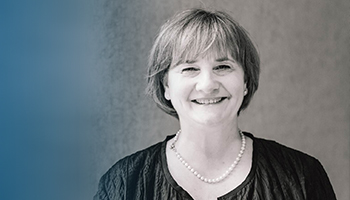HOW CAN WE HELP YOU? Call 1-800-TRY-CHOP
In This Section
Improving Outcomes, Inspiring Nurse Scientists: Q&A with Ruth Lebet, PhD, RN

Ruth Lebet, PhD, RN, nurse scientist in the Center for Pediatric Nursing Research and Evidence-Based Practice, focuses her research on pediatric sedation, critical care, and nurse workloads.
Editor’s Note: With the World Health Organization (WHO’s designation of 2020 as “Year of the Nurse and the Midwife” we are taking this special opportunity to recognize the community of nurse scientists at Children’s Hospital of Philadelphia. Throughout the year, we will feature nurse researchers in a series of Q&As that touch on everything from their research projects to the unique perspective of nurse scientists. This Q&A with Ruth Lebet, PhD, RN, nurse scientist in the Center for Pediatric Nursing Research and Evidence-Based Practice at CHOP, is the first in the series. We are proud to share the valuable work and wisdom of our CHOP nurse scientists!
Why do you think the nurse scientist’s perspective is unique and integral to pediatrics?
Nurse scientists come from a clinical background, and we generally are about improving outcomes for our patients. I also think that nurses are very practical people. In the questions that we ask, we hope that we’re identifying information that can be implemented quickly and that can have an impact right away.
I think the other thing in pediatrics is that we know that almost everything that we do touches on the family in some way. Nurse scientists make an effort to not only get the family perspective related to whatever they’re looking at, but also look at the experience for the family.
When did you begin to integrate research into your career?
I have always worked at academic medical centers; even as a staff nurse, I had the opportunity to participate in projects, mostly as a data collector. When I became an advanced practice nurse, I stepped up my participation a little bit. As a clinical nurse specialist in the pediatric emergency department, I did data collection. I then became a nurse practitioner working on the pediatric pain service, where I participated as a project manager for a couple of studies and did data collection for studies with our patient population as well.
When I was at DuPont in my job as a clinical nurse specialist, I had a unique opportunity to be the co-PI at our site for Dr. Martha Curley’s multi-site clinical trial, the RESTORE study. One exciting aspect of that project was that Dr. Curley wanted there to be a nurse-physician co-PI at every site. While our site was participating in RESTORE, Dr. Curley recruited me to be the clinical project manager for the study. I was the clinical project manager for that 31-site trial, which was such an incredible learning experience.
What did you like best about participating in this research?
I loved being able to interact with all of the different sites. And it gave me a broader perspective on my world of pediatric intensive care unit (PICU) nursing. I thought the trial was a worthwhile project because it was about a nurse-managed sedation protocol, and it increased nurses’ autonomy. I thought that it was really valuable from that perspective. And I enjoy working with Dr. Curley. She has such big ideas, and she’s so motivated and inspiring.
It sounds like pediatric sedation and critical care was the subject of the study, but it’s also one of your research areas of focus today. Is there any specific reason you chose to focus on critical care?
Actually, there’s a big reason. As you can tell from the fact that I graduated from nursing school in 1979, I’ve been a nurse for 41 years. Despite that fact, I did not go back to get my PhD until later on. So, I’m a seasoned nurse, but a baby PhD. But I was also once a clinical specialist in the PICU. And our job as clinical specialists is to work with nursing staff and make sure that patients are getting the best care that they can. We’re a resource to the nursing staff when patients present challenges.
One of the big challenges that I frequently saw in the PICU was that there was a population of kids who were challenging to adequately sedate. I can’t even imagine what it’s like to be a 3- or 4-year-old in the PICU and not be sedated. And if you’re a parent, and you see your child seem like they’re struggling all the time, that doesn’t feel good. If you’re a staff member, a nurse particularly, you’re worried that something is going to happen to the child because of all these lines and tubes and drains, and they could hurt themselves if anything came out. That was one of the big reasons that I had an interest in sedation and critical care: There was a subgroup of our population that was really challenging.
Would you like to share any current or recent research projects that you’re excited about?
A project that I also worked on with Dr. Curley was part of a study called the HALF-PINT Study. This was a study of tight glycemic control in PICU patients. Dr. Curley and I looked at a nursing question associated with the study: How does implementing a protocol impact nurses’ workload? Nurses in the ICU have an intense workload, but there also are so many aspects of peds critical care that are driven by protocols.
So, we came at it from a little bit of a human factors perspective. We used validated and reliable workload perception tools to compare nurses’ responses of what they felt their work was like, in general. And then we asked them, so how does having a child on this protocol influence your workload? I was very interested in the project because, again, going back to being a clinical specialist and supporting the work of nurses, knowing how something impacts their workload, that’s the first step. And then try to figure out, well, if it impacts the workload, what can we do to lessen that impact?
We know you have another special interest as a nurse scientist at CHOP. Can you tell us more about that?

Nurse scientists combine their experience as clinicians with their expertise as researchers to improve the outcomes and experiences of patients, families, and clinical staff.
I have a real interest in identifying the next generation of nurse scientists. I work 20 hours a week in my nurse scientist role, and then I also teach at the School of Nursing at Penn in the Clinical Nurse Specialist program.
One of my goals in my role as a nurse scientist is to find people who have an interest in research. Maybe individuals want to undertake their very first research project, and I help them do that in such a way that it’s a positive experience. Once they have had success, I start the conversation of, “Don’t you think you want to go back and get your PhD?”
I’m in a unique position to do that because of my educational background, so I’m used to kind of mentoring people through the process. Plus, my work for Dr. Curley as a clinical project manager gives me a real understanding of the nuts and bolts of how to make a research project move forward, and some of what the pitfalls are. I think it’s so important that individuals have a positive experience. You know, sort of when you put your toe in the water for the first time, if it’s not a good experience, you never try again. So, that’s really, really important to me, to support others in a positive way.
Do you have any advice or words of wisdom for aspiring nurse scientists?
What I would say is that if nurses think they have an interest in becoming nurse scientists, they should definitely connect with our Center. It’s reasonable to start small and build on your experience so that if you’re not sure, you can talk to someone in your clinical area who’s doing research and say, “I’d really like to be part of your project – how can I engage?” And if you have an idea for a project, you should reach out to us in the Center. There are lots of opportunities to get mentored. One of the great things about CHOP’s Nursing and Clinical Care Services Department is that we do have this Center; it is a really unique resource.
Learn more about nursing research at CHOP in this guest blog by Margaret McCabe, PhD, RN, PNP, director of the Center for Pediatric Nursing Research and Evidence-Based Practice.


